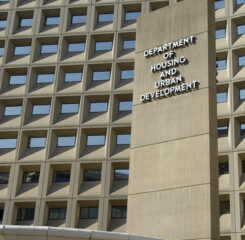Affordable Housing in FY24 Budget Request Overview
On March 9, the White House delivered an overview of its fiscal year 2024 budget request to Congress. Until March 13, when more detailed budget request documents are scheduled to be released, only broad overviews of the request have been made available by the Administration. The Administration’s request for housing is a mix of discretionary and mandatory spending.
“The President’s 2024 Budget directly supports this historic Administration’s goal of building a better America for all. For those of us at HUD, that means addressing homelessness with urgency and ensuring everyone in this country has access to quality affordable housing,” HUD Secretary Marcia L. Fudge said in a March 9 statement.
The request seeks $7.5 billion in mandatory funding for new Project-Based Rental Assistance contracts with private nonprofit and for-profit owners to provide affordable housing for households with extremely low incomes. These would be the first new such contracts in decades and represent deeper income targeting than currently required by the PBRA program. “Producing and preserving housing that is affordable for [ELI] households – and ensuring rents remain affordable for those households – is a critical component of tackling the Nation’s housing challenges that often requires additional subsidy,” the White House documents say. Making the funding “mandatory” means it would not be funded with appropriated dollars, but rather with tax expenditures. The likelihood of securing such mandatory funding for housing programs in FY24 is very low but it is a positive step for the Administration to be on record in support of mandatory housing funding.
The request seeks $228 million in new funding to create 2,200 new Section 202 Supportive Housing for the Elderly Homes and Section 811 Housing for Persons with Disabilities; of the funding in the request for these new homes, LeadingAge understands that 1,000 of them will be through the Section 202 program. All will be revealed in the more detailed budget documents to come.
For the Housing Choice Voucher program, the budget seeks funding for 50,000 new vouchers and a guarantee of vouchers for veterans experiencing homelessness, over a 10-year period, and for youth aging out of foster care. The HOME program would see a $300 million increase if the budget request were to be enacted.
The budget would also centralize inspection-related funding for HUD-assisted multifamily properties and Public Housing, which the request says would “enhance HUD’s ability to address financial and physical risks and would complement HUD’s cutting-edge National Standards for Physical Inspection of Real Estate (NSPIRE) inspection standards.”
For investments in climate resilience, carbon reduction, and mitigation and adaptation actions, the request is seeking $752 million for public and assisted housing.
The request would triple current expand tax expenditures (mandatory spending) for the Low Income Housing Tax Credit (LIHTC). Specifically, the request permanently increases the allocation of tax credits states receive. The request also seeks improvements to the LIHTC program: requesting to reduce the private activity bond financing requirement from 50% to 25% to leverage more private capital into LIHTC deals and build more units of affordable housing; and to repeal the qualified contract provision and right of first refusal provision, both of which allowed some owners of LIHTC units to exit requirements to keep rents at affordable levels and have threatened nonprofit ownership of LIHTC housing.
FHA Receipts
As close followers of the HUD budget and appropriations process know, revenue (aka “receipts”) from Federal Housing Administration insurance programs provide funding appropriators often rely on to help pay for the annual HUD appropriations bill. FHA insures mortgages made by lenders to home buyers with low down payments and to developers of multifamily rental buildings containing relatively affordable units. FHA collects fees from insured borrowers, which are used to sustain the insurance fund. Surplus FHA funds are used to offset the cost of the HUD budget. Preliminary projections from the Congressional Budget Office anticipate dramatically decreased receipts available from the FHA to effectively help pay for the FY24 HUD appropriations bill, creating pressure on appropriators to identify sufficient funding.
Read Secretary Fudge’s statement here.
Read the FY24 budget request overview here.

Most Recommended
November 08, 2024
 HOTMA: New Rules for Housing
HOTMA: New Rules for Housing
November 06, 2024
 Colleagues on the Move, November 6, 2024
Colleagues on the Move, November 6, 2024
November 06, 2024
 Analysis: What Does the Final CY2025 Home Health Rule Include?
Analysis: What Does the Final CY2025 Home Health Rule Include?
October 29, 2024
Katie Smith Sloan Urges Members to Build a Movement, Take Action
Recently Added
December 13, 2024
CAST Members in the News
December 13, 2024
a2 Pilot Awards Open for AI-based Healthy Aging Projects
December 13, 2024
HUD Finalizes 30-Day Eviction Notification Rule
December 12, 2024



